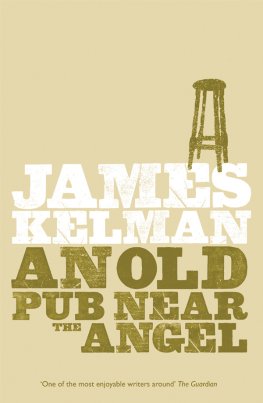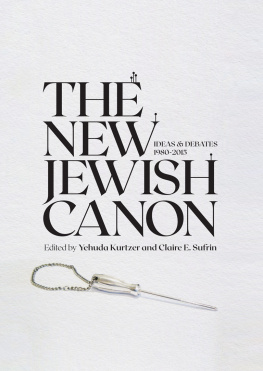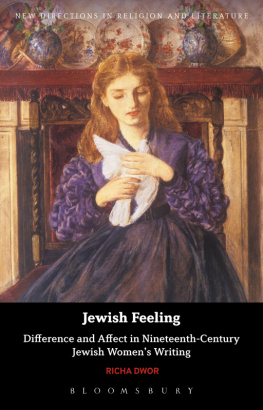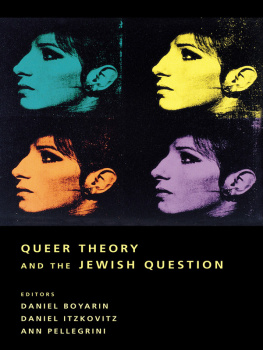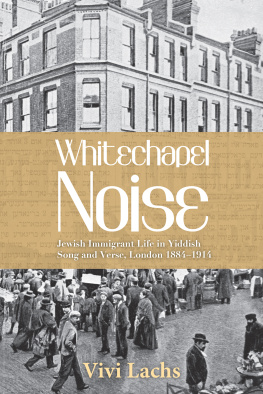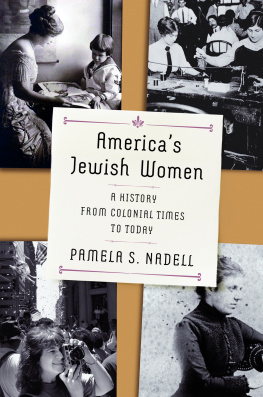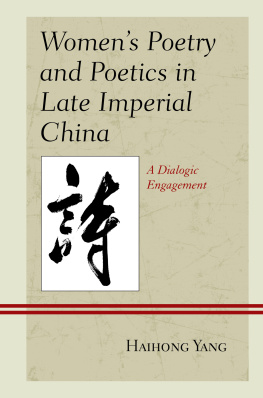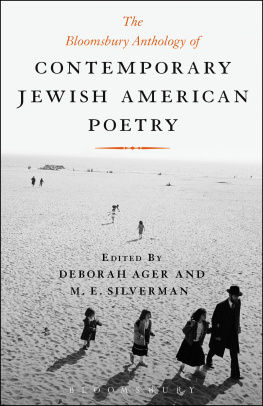QUEER EXPECTATIONS
SUNY series in Contemporary Jewish Literature and Culture
Ezra Cappell, editor
Dan Shiffman, College Bound:
The Pursuit of Education in Jewish American Literature, 18961944
Eric J. Sundquist, editor, Writing in Witness:
A Holocaust Reader
Noam Pines, The Infrahuman:
Animality in Modern Jewish Literature
Oded Nir, Signatures of Struggle:
The Figuration of Collectivity in Israeli Fiction
Zohar Weiman-Kelman, Queer Expectations:
A Genealogy of Jewish Womens Poetry
Richard J. Fein, translator, The Full Pomegranate:
Poems of Avrom Sutzkever
QUEER EXPECTATIONS
A GENEALOGY OF JEWISH WOMENS POETRY
ZOHAR WEIMAN-KELMAN

Cover: Ren Magritte, Lola De Valance, 1948, used by permission of the Socit des auteurs dans les arts graphiques et plastiques (ADAGP).
Published by State University of New York Press, Albany
2018 State University of New York
All rights reserved
Printed in the United States of America
No part of this book may be used or reproduced in any manner whatsoever without written permission. No part of this book may be stored in a retrieval system or transmitted in any form or by any means including electronic, electrostatic, magnetic tape, mechanical, photocopying, recording, or otherwise without the prior permission in writing of the publisher.
For information, contact State University of New York Press, Albany, NY
www.sunypress.edu
Library of Congress Cataloging-in-Publication Data
Names: Weiman-Kelman, Zohar, 1982- author.
Title: Queer expectations : a genealogy of Jewish womens poetry / Zohar Weiman-Kelman.
Description: Albany : State University of New York Press, [2018] | Series: Suny series in contemporary Jewish literature and culture | Includes bibliographical references and index.
Identifiers: LCCN 2017061601 | ISBN 9781438472232 (hardcover : alk. paper) | ISBN 9781438472249 (e-book)
Subjects: LCSH: Hebrew poetry, ModernHistory and criticism. | Jewish lesbiansPoetryHistory and criticism. | Jewish poetryWomen authorsHistory and criticism. | Hebrew poetryWomen authorsHistory and criticism. | Yiddish poetryWomen authorsHistory and criticism. | Lesbianism in literature. | Lesbians in literature.
Classification: LCC PJ5024 .W45 2018 | DDC 809.1/99287089924dc23 LC record available at https://lccn.loc.gov/2017061601
10 9 8 7 6 5 4 3 2 1
CONTENTS
ACKNOWLEDGMENTS
This book has been a journey, looking inward and outward / at once before and after / seeking a now that can breed / futures, in the words of black, lesbian, mother, warrior, poet Audre Lorde. Before I invite readers to join this journey, I want to give thanks to all those who brought me here, home, now.
Thank you to my mother Paula, who taught me that women are not only an acceptable topic, but the topic. I was fortunate enough to find scholarly support for this approach thanks to Tamar Hess at the Hebrew University in Jerusalem, where I also found my way to Yiddish, thanks to Hanan Bordin; together they set me on the path of Yiddish womens writing. This led me to the Department of Comparative Literature at the University of California, Berkeley, which proved to be the perfect home for the queer comparisons I was compelled to explore as this project developed. My dissertation committee chair, Chana Kronfeld, taught me to reimagine the relationship between Hebrew and Yiddish, the relationship between scholarship and activism, and most importantly, the relationship between scholars, offering new models of creative collaboration. Naomi Seidman shared with me her rare academic cocktail of rigor, chutzpa, and creativity. Our conversations, whether in Berkeley, Warsaw, or Toronto, always keep me on my toes. Both Chana and Naomi generously read multiple drafts of this project in dissertation form, often giving opposite advice and always providing challenging questions steeped in love and encouragement. Daniel Boyarin showed me how queer Jewish studies could be, and helped me claim a place there. Judith Butler has been a true mensch, a source of support and inspiration for bringing together multiple lines of resistance.
Since becoming an academic grownup, I have been blessed with new mentors, who are also dear friends: Ayelet Ben-Yishai granted me the gift of her benevolent bossiness, which consistently pays off, and Anna Shternshis held my hand and had my back, keeping me kosher through the job-and-book market. My colleagues at Ben Gurion University, especially Yael Ben-zvi, Catherine Rottenberg, and Eitan Bar-Yosef, cheered me on through the final stages of this book project, and have given me a reason to stay in the game.
This project became a book thanks to the Anne Tanenbaum Postdoctoral Fellowship at the Centre for Jewish Studies at the University of Toronto, where I received warm and enthusiastic support for two years. Prior to that, the Department of English at Haifa University provided me with a teaching fellowship, and gave me hope for the power of scholarship as a tool of connection and empowerment in Israel/Palestine. The Townsend Center for the Humanities Discovery Fellowship, the Berkeley Fellowship and Deans Normative Time Fellowship supported four blissful years of concentrated study and writing at the University of California, Berkeley. The Foundation for Jewish Cultures Maurice and Marilyn Cohen Dissertation Fellowship gave me a much-needed year of dissertation completion funding. The Posen Foundation summer workshop, the Women and Gender Studies Dissertation writing seminar, and the Center for the Study of Sexual Cultures dissertation retreat all gave me precious feedback at different stages of the writing process. Grants from the American Council of Learned Societies, the Max Weinreich Center, the Center for Jewish History, the Helen Diller Family Foundation, and the Taube Foundation funded my many research trips to New York, Poland, Germany, and Israel/Palestine.
My father, Levi, read every single word of this book and offered invaluable editsproving that being a radical rabbi and being a queer academic are much closer than I expected. Marty Fink and Monica Pearl read the first version of the manuscript, enacting the cross-generational dialogue this book imagines: they pushed me to make both my rage and passion come through. During the final stages of writing, Laura Stacer-Porter birds-eye view helped me refind my voice and ensured that I was getting my points across. Ri J. Turner dove into the manuscript with astonishing skill and zeal, making my arguments sharper, and saving me from many potential blunders. Im also grateful to the many online friends who helped me pick the title, and reminded me that someone was waiting for my book in the real world. Thanks to Rafael Chaiken, Ryan Morris, and Ezra Cappell at SUNY Press for making the book a reality, and to the reviewers who made that reality better.
For countless conversations, comments, and cups of coffee, I want to thank my elders, colleagues and coconspirators: Elizabeth Abel, Sarrah Alghamdi, Asaf Aharonson, Salma Al Atassi, Michael Allan, Suzi Andreis, Inbal Arnon, Michal Aronzon, Nadia Awad, David Biale, Ella Ben-Hagai, Chana Bloch zl, Brenda Cossman, Ruby Cymrot-Wu, Carolyn Dinshaw, Deema Darawshy, Rachel Epstein, Sidra Ezrachi, Maura Finkelstein, Leora Gal, Coco Guzman, Ettie Freifeld, Galit Hasan-Rokem, Nayrouz Abu Hatoum, Noa Hever-Polak, Kathryn Hellerstein, Alex Jaunait, Orev Reena Katz, Martin Kavka, Natalie Kouri-Towe, Vivi Lachs, Tamir Lederberg, Laura Levitt, Lital Levy, Heather Love, Barbara Mann, Krystyna Mazur, Ana Minian, Sarah Anne Minkin, Durba Mitra, Anat Moses, Yigal Nizri, Noki, Anita Norich, Dana Olmert, Ilana Pardes, Jake Payne, Eddy Portnoy, Yosefa Raz, Ariel Rokem, Naama Rokem, Hershel Russel, Allison Schachter, Esther Schor, Jeffrey Shandler, Maya Shapira, Davey Shlasko, Ivy Sichel, Andrew Sloin, Barbara Spackman, Dean Spade, Nicole Taylor, Evelyn Torton Beck, Pani Michelle Viise, Rachel Wamsley, Zoe Whittall, Shira Wolosky, Anna Zawadzka, Rawan Zaytoun, and Amalia Ziv.


